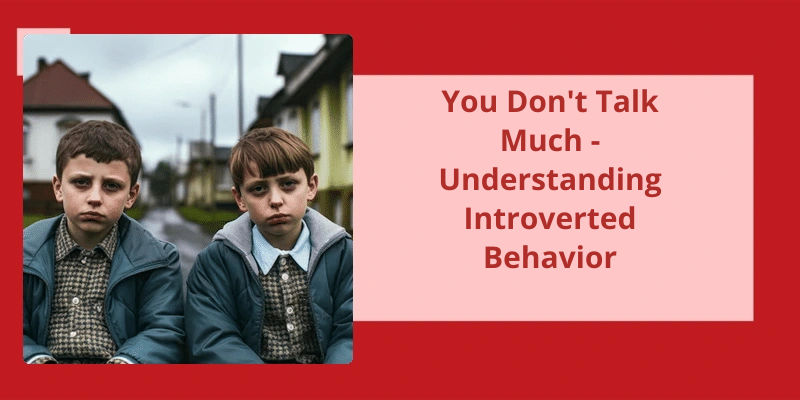As humans, communication is an intrinsic part of our social lives. We’re wired to express ourselves, divulge our opinions and ideas, and interact with others. However, some people have a more reserved nature, finding it hard to articulate themselves or participate in conversations frequently. You may even come across someone who doesn't interact much at all, leaving you wondering why? Are they shy, introverted, or are they hiding something? It's easy to assume that this person has nothing interesting to say, but, in most cases, this isn’t true. Perhaps it's time to understand that sometimes, silence speaks louder than words. In this article, we'll delve deep into the reasons why someone may not talk much, and what it means for their mental health, personality, and relationships.
What Does It Mean if You Don’t Talk Much?
There are many reasons why some people may not talk very much, and it’s important to understand that there’s no one-size-fits-all explanation. One possible reason is shyness or social anxiety. People with these conditions may feel nervous or self-conscious in social situations, which can make it difficult to participate in conversations. They may worry about saying the wrong thing, being judged by others, or simply not knowing what to say.
Another possible reason for not talking much is personality traits. Some people are naturally introverted, meaning that they tend to be more quiet and reflective than outgoing and talkative. Introverts may be perfectly comfortable in social situations, but they may prefer to listen and observe rather than actively participate in conversations. In contrast, extroverts tend to be more outgoing and talkative, and they may find it difficult to stay quiet for long periods of time.
It’s also worth noting that some people may not talk much simply because they don’t have anything to say. For example, if youre in a group where everyone is talking about a topic that youre not particularly interested in, you may choose to stay quiet rather than contribute to the conversation. Alternatively, if youre in a situation where you feel like you don’t have anything to add, you may choose to stay quiet as well.
Ultimately, there are many potential reasons why someone might not talk much, and it’s important not to make assumptions about why someone might choose to be quiet. If youre concerned about someone who seems withdrawn or quiet, it’s okay to check in with them and see if theyre doing okay. However, it’s also important to respect their boundaries and not pressure them to talk if theyre not comfortable doing so.
As humans, we all have those moments where we feel like we just don’t have much to say. It’s a perfectly normal occurrence, and often it’s just a sign that our minds need a break. However, some may feel ashamed or embarrassed about not having anything to add to a conversation. This can be especially true for those with social anxiety, who may worry about being judged by others for not contributing to the discussion.
Is It Normal to Not Have Much to Say?
It’s important to remember that conversation is a two-way street and it’s okay to let the other person lead the conversation at times. It’s also important to remember that quality over quantity should be the focus of conversations. It’s better to have a few meaningful interactions than a lot of small talk.
There are also many non-verbal ways to communicate and connect with others. Body language, eye contact, and active listening can be just as important as verbal communication. Sometimes, taking the time to really listen and understand what someone else is saying can bring more depth to a conversation than constantly talking about yourself.
It’s also important to consider the context of the situation. If youre in a new or unfamiliar environment, it’s natural to feel unsure of what to say. It can be helpful to ask open-ended questions to get to know people and make them feel listened to. Additionally, if youre tired, stressed, or not feeling well, it’s perfectly okay to not want to engage in conversation. It’s important to prioritize self-care and not feel guilty about needing alone time.
Overall, it’s normal to not always have something to say and it’s important to not put too much pressure on ourselves. Focusing on quality over quantity and utilizing non-verbal communication can also enhance our interactions with others. Ultimately, it’s important to prioritize our own well-being and do what feels comfortable for us in social situations.
The Impact of Social Anxiety on Conversation Skills and How to Overcome It.
Social anxiety can negatively affect conversation skills by causing feelings of nervousness and fear in social situations. This can lead to avoidance of social situations and difficulty in forming relationships. To overcome social anxiety and improve conversation skills, individuals can seek therapy or practice relaxation techniques, challenge negative thoughts, and gradually expose themselves to social situations.
Conclusion
In conclusion, it’s important to remember that not everyone communicates in the same way. Just because someone doesn't talk much doesn't mean they’re uninterested, shy, or lacking in personality. It’s also important to recognize that some people may have communication barriers, such as social anxiety or language differences, that prevent them from speaking up. Rather than assuming someone's silence is negative or insignificant, we can take the time to understand their communication style and respect it accordingly. It’s through openness and understanding that we can build meaningful connections with others, regardless of how much or how little they speak.






